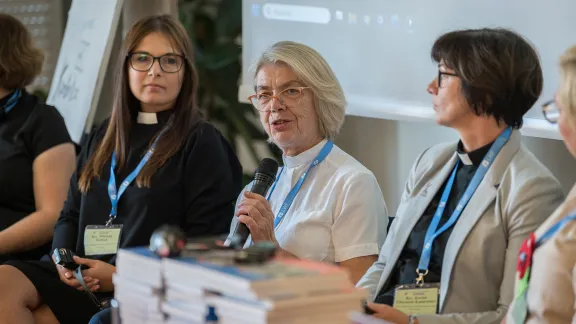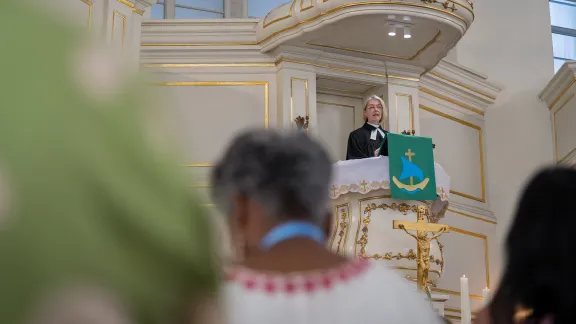In this interview, Rev. Halina Radacz talks about her journey to become a pastor, her Lutheran identity as a person belonging to a minority group in Polish society, and her church’s long process to ordain women.

Rev. Halina Radacz from the Evangelical Church of the Augsburg Confession in Poland with fellow woman pastors on a panel presenting the story on the process of their church towards including women in the ordained ministry. Photo: LWF/Albin Hillert
Voices from the Communion: Rev. Halina Radacz from the Evangelical Church of the Augsburg Confession in Poland
(LWI) - After studying theology at the Christian Theological Academy in Warsaw (Chrześcijańska Akademia Teologiczna w Warszawie - ChAT) and successfully passing the First Theological Examination, Halina Radacz was installed as a catechist in the Evangelical Church of the Augsburg Confession in Poland (ECACP) in 1987. Her male counterparts were ordained as pastors.
In May 2022, after 35 years of service in her church, Radacz was one of the first women to be ordained as pastor in her church. In this interview, she talks about her journey into ordained ministry and the challenges of serving the church and people in the Polish context.
Please tell us something about your childhood and background.
On my father’s side, our family has been Lutheran since the Reformation. Dad was always proud of this centuries-old family tradition. My mother had become a Protestant by choice. It was a well-thought-through decision on her part: She was convinced that, as a Protestant, she could freely ask questions and look for answers.
When classmates teased me at school because of my religion, she gave me valid arguments I could use to defend myself. Once, in 7th grade, verbal arguments didn’t suffice, and I got into a physical fight with a classmate. I talk about this because, on the one hand, it was not easy to be Protestant in a Catholic society. On the other hand, it helped to strengthen my identity! –that sense of being different and the awareness of being Protestant. My parents were open-minded, especially my father, who disagreed with simple generalizations and stereotypes.
My mother died when I was 16. I was a rebellious teenager, arguing with God and accusing Him of being insensitive and unjust. I asked: why and for what? At the same time, the parish and the parish youth group were the places where I felt safe and received support.
Over time, my rebellion and questions led to trust and an awareness that God has plans for us and me, and never leaves us alone and disappoints us.
You are among the first women ordained in your church. When did you study theology, and what motivated you to do so?
I did not want a job that required sitting at a desk. I wanted to work with children and young people. I thought about becoming a history teacher because I was very interested in the subject. But it was the 1970s. In communist Poland, it was impossible to talk about critical points of history; for example, the Ribbentrop-Molotov Non-Aggression Pact with its Additional Protocol of 1939 or the Katyn massacre in which thousands of Polish officers, intellectuals, and clergy – the elite of my country – were murdered.
I wanted to know the truth and believe(d) in truth, so I chose theology. I was convinced that one did not need to be a pastor to serve the church. My father tried to dissuade me. He tried to convince me that, as a woman, I would spend my life fighting for equality. And he was right, although I did not believe him then, because I saw the church as a safe and just place of truth and love.
In what capacities did you serve your church as a non-ordained theologian?
I completed my theological studies and passed the First Theological Examination of my church – like the men. Then, my colleagues were ordained as pastors, while I was installed as a catechist for church education.
I spent the first year of my ministry in Sopot, in my home parish. I worked as a catechist. At the same time, I regularly organized and held church services – without holy communion. After that, I worked in Działdowo and Olsztynek in Masuria. My supervisor lived 30 kilometers away, and I ran the congregation. He came once every three months to celebrate the communion service.
At that time, I again began to ask myself: Why can’t I be a pastor? Why can’t I serve God and the church without limitations? Why can’t I administer Holy Communion to the sick and elderly parishioners I visited?
What has changed in your church since the introduction of women’s ordination?
After a 70-year process, my church has joined the churches where the ordained ministry builds on the priesthood of all baptized and perceives God’s gifts regardless of gender. With time, that will transform the church into a community of sisters and brothers with equal rights of participation and responsibility.
I am convinced that through this process, we will become more credible in proclaiming the Gospel and the reconciling mission of Jesus Christ. He gave his life for all people, regardless of gender, sexuality, or background.
International relationships and meetings have played an important role for many women. What experiences and insights have you drawn from them?
During my theology studies, we had no access to feminist theology and literature in Poland. On the one hand, that was due to language barriers; on the other hand, our professors had no interest in passing such material on to the students. If information reached us, it was only in the form of below the belt jokes.
Nevertheless, personal contacts with theologians and committed women from Western Europe helped us to gain a different perspective on our role in the church and a different interpretation of well-known texts. At the same time, they gave us the courage to say out loud that we have rights, and that the dignity of women must be restored because Jesus of Nazareth, the Christ of God, gave it to us in his person, work, and life two thousand years ago.
Within Poland, we have built a strong women’s network. We meet for discussions and to carry forward issues that are important to all of us. That strengthens our community and what we can achieve together.
I remember a meeting in Bielsko-Biała on the theme of anointment and thus about the vocation to ministry. I think it was then that I felt for the first time that I was called to the ordained ministry. That it was not just my desire but a spiritual imperative. That the one who had called me was Jesus Christ, and no one should take that calling away from me.
Is there a particular biblical text whose interpretation from a woman’s perspective is especially important to you?
I have three favorite texts:
- Martha and Mary of Bethany (Luke 10:38-42). Traditionally, Martha is the one who serves – diakonia. Mary is the one who listens and prays – prayer. For me, Martha is the one who adheres to the established rules of society – a woman’s place is serving. Mary is the one to whom Jesus gave the right to learn – she chose the better part.
- Mary Magdalene – the apostle to the apostles (John 20:1-18). There were no coincidences in Jesus’ actions, in God’s plan of salvation. Why was she the first to meet the risen Jesus? Why was she the first to proclaim His resurrection?
- Lydia (Acts 16:14f). Because of her faith, her entire house was baptized, that is, all who lived in it. Who led the church planted in Lydia’s house?
Of course, there are many other important texts (also in the Old Testament), but these have fundamentally changed my thinking about the role of women in the church.

Rev. Halina Radacz from the Evangelical Church of the Augsburg Confession in Poland preaching at the opening service of the Women’s Pre-Assembly held in Wroclaw, Poland. Photo: LWF/Albin Hillert
Your church hosted the Thirteenth Assembly and the Pre-Assemblies, including the Women’s Pre-Assembly. What did it mean to you to preach at this event?
When I was asked to preach at the opening service of the women’s pre-assembly in Wroclaw, I felt honored and happy. Then came fear and a sense of responsibility. In the end, however, it was an opportunity to share what I consider one of the most important messages of the Gospel: “In Christ Jesus, you are one.” That means we are obliged to build a community without exclusion, humiliation, or condemnation. We are all children of God, and God calls all of us to reconciliation in Jesus Christ with the Father and the brothers and sisters around us.
What message do you have for young women and men on their way to the ordained ministry or another church-related profession today?
In Luther’s theology, there is the concept of the “visible church” and the “invisible church.” The visible church is the one we know, made up of us as imperfect human beings. It stands and falls with us, our ordinances and regulations, and our administration. It is not a perfect organization – because we are not perfect.
Sometimes, young people give up because they are afraid of this imperfection. But there is also an invisible church, seen by God, which I would like to reflect on with Jesus’ words from the Sermon on the Mount: “Strive first for the kingdom of God and his righteousness, and all these things will be given to you as well” (Matthew 6:33). We seek the kingdom of God and at the same time we help to build it. I wish for young women and men not to give up when they recognize the imperfection of their church but to try again and again to change it so that it comes closer to the image of the kingdom of God.


